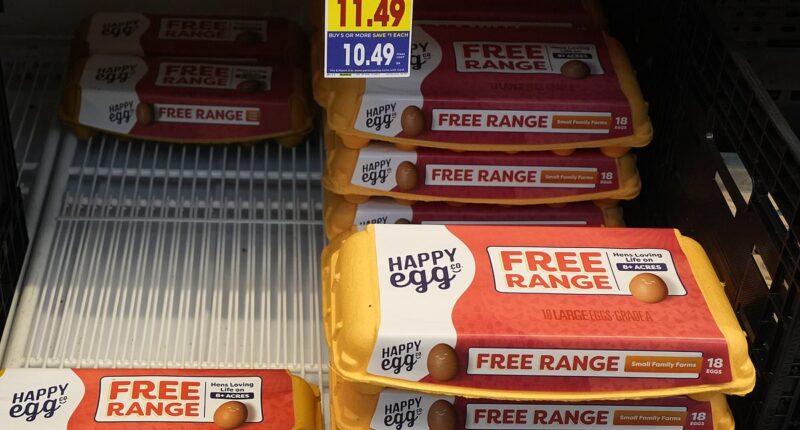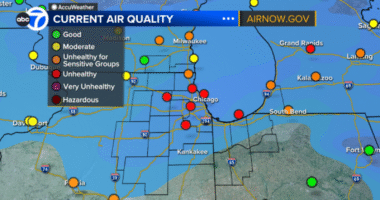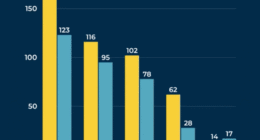American consumers already feeling the squeeze amid tariffs and the bird flu may soon have to scramble to find the lowest prices on beef.
Data from the US Bureau of Labor Statistics reveals that sirloin steak prices were close to hitting a record high last month, averaging at $11.97 per pound, just a few cents below the November peak of $12.01 per pound.
At the same time, ground beef cost an average of $5.55 per pound in January, down slightly from a record-high of $5.67 in September.
In general, beef and veal prices were 5.5 percent higher on average in January than they were the year prior.
Tracking the trends since the 1980s, the Bureau of Labor Statistics observed that prices for sirloin steak and ground beef had been relatively steady until the onset of the COVID-19 pandemic. The shift towards home cooking during the pandemic’s early days led to an increase in demand for these meats, as reported by Nerdwallet.
The current elevated prices are expected to persist, with no signs of relief in sight. Contributing to the price surge is a shortage of cattle exacerbated by tariffs imposed by former President Donald Trump on imports from Canada and Mexico.
Beef cattle inventory in the United States has fallen to the lowest levels in 64 years, sending the prices on beef cows soaring, Drovers reports.
A drought in some cattle-rearing areas has culled some of the livestock, and in November, the US banned imports on Mexican cattle following the discovery of New World Screw Worm, according to the Owen Sound Sun Times.

Beef and veal prices were 5.5 percent higher on average in January than they were the year prior, and the high prices show no signs of easing amid a cattle shortage
The US Department of Agriculture’s animal and plant inspection service announced earlier this month a comprehensive inspection and treatment protocols designed to allow the resumption of imports.
But any cattle that are imported may be subjected to Trump’s tariffs, which were temporarily paused on Monday after sending the global markets stirring.
In the meantime, soaring egg prices have launched shoppers into an egg-buying frenzy – forcing some supermarket chains to limit the number of eggs shoppers are allowed to purchase.
Costco and Whole Foods, for example, are limiting customers to buying three packages a day after a viral clip showed frantic Costco shoppers loading dozens of eggs in their carts, emptying the store of its stock in ‘less than 10 minutes.’
Walmart, meanwhile, is only allowing shoppers to buy two 60-count packages per trip, a spokesperson told Business Insider.
And Trader Joe’s confirmed to Fox Business that it is ‘currently limiting egg purchases to one dozen per customer, per day.’
The cap will impact about 600 Trader Joe’s locations nationwide.
‘We hope these limits will help to ensure that as many of our customers who are able to purchase them when they visit Trader Joe’s,’ the company said.

President Trump’s tariffs stirred the market on Monday after temporary agreements were made with both Mexico and Canada leading to a 30-day pause in trade action
The flu outbreak has even emboldened criminals, including a group of thieves who recently stole around 100,000 eggs worth approximately$40,000 from the back of a distribution trailer in Pennsylvania.
Meanwhile, Georgia-based Waffle House confirmed last week that it implemented a 50-cent-per-egg surcharge on all its menus.
‘Consumers and restaurants are being forced to make difficult decisions,’ Waffle House said.
‘We are continuously monitoring egg prices and will adjust or remove the surcharge as market conditions allow.’
For now, though, the cost of eggs is outpacing inflation as an ongoing bird flu epidemic forces farmers to kill all of their chickens – sending egg prices soaring.

The cost of eggs has begun to outpace inflation, with the bird flu outbreak being a primary reason for the shortage and price hikes
Since 2022, 153 million commercial, backyard and wild birds across 48 states have been infected by H5N1 – a novel strain of bird flu. Millions more animals have been euthanized to stop the spread of the virus.
Under the USDA’s policy, anytime the bird flu virus is found on a poultry farm, the entire flock is slaughtered to help limit its spread.
And with massive egg farms routinely housing more than 1 million chickens, just a few infections can cause a supply crunch.
Cage-free egg laws may also be responsible for some supply disruptions and price increases.
Organic and cage-free eggs are already more expensive than other varieties, but new laws in 10 states set minimum space for chickens or cage-free requirements for egg-laying hens.
The combination of factors have caused the average price of a dozen eggs to increase 60 percent in December from the year prior, hitting a record high of $4.15.
While this fell short of the $4.82 record set two years ago, the Agriculture Department predicts prices are going to climb another 20 percent this year.
It said that egg supply ‘remains limited and inconsistent in many retail markets with many affected grocers employing steps to limit consumer purchasing to stretch their existing supplies.’

















